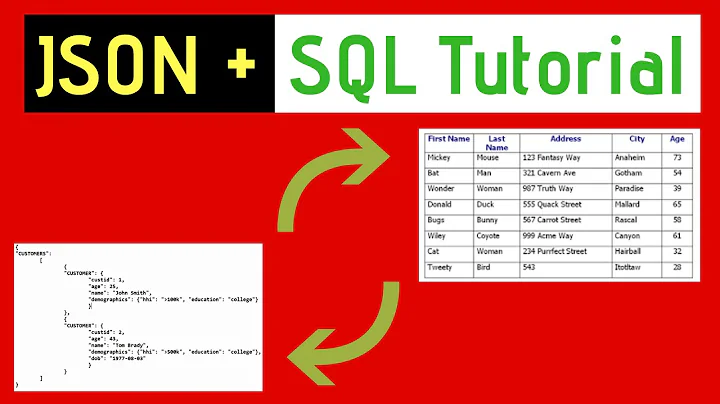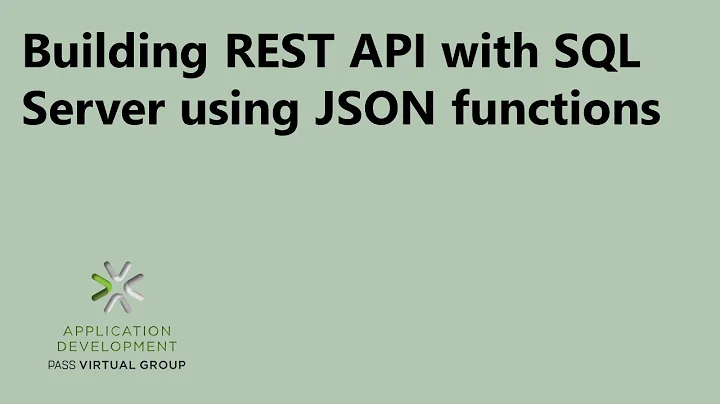SQL Server SELECT to JSON function
Solution 1
Starting from SQL Server 2016 you can use for json:
declare @t table(id int, name nvarchar(max), active bit)
insert @t values (1, 'Bob Jones', 1), (2, 'John Smith', 0)
select id, name, active
from @t
for json auto
With older versions of SQL Server you can use for xml path, e.g.:
select '[' + STUFF((
select
',{"id":' + cast(id as varchar(max))
+ ',"name":"' + name + '"'
+ ',"active":' + cast(active as varchar(max))
+'}'
from @t t1
for xml path(''), type
).value('.', 'varchar(max)'), 1, 1, '') + ']'
Output:
[{"id":1,"name":"Bob Jones","active":1},{"id":2,"name":"John Smith","active":0}]
Solution 2
Just for improving answer with latest technology change. with sql server 2016
select id, name ,active
from tableName
FOR JSON AUTO
Solution 3
So first off, I want to thank Kirill Polishchuk for the essential code sample ... thank you!
I took that and went to build a procedure to do what I need it to do, and that is to give me a JSON output based on "any" result set I want i.e. table object (not variable) in SQL Server.
Ideally, I would want this as a function, however due to limitations on what you can do within a function, that part will have to wait ... maybe v2. :)
And yes, registering an extended procedure (CLR) definitely be easier, but I wanted to avoid going that route for the time being.
PS: for temp tables, just put in 'tempdb..#tablename'
Here it is:
/*
Author: Goran Biljetina
Create date: 03/13/2013
Description: consume a table object (not table var), output it as JSON Properties string
*/
/*
--> example run
-- EXEC dbo.JSONreturn @tblObjNameFQ='[database].[schema].[object_name_table]';
*/
CREATE PROCEDURE dbo.JSONreturn
(
@committedRead bit = 0 --> if 1 then committed else uncommitted read
,@debugmode bit = 0 --> if 1 display certain outputs
,@tblObjNameFQ varchar(128) --> fully qualified table object name, i.e. db.schema.object_name
,@stringJSON nvarchar(max) = null OUTPUT
)
AS
BEGIN
if @committedRead=0
begin
SET TRANSACTION ISOLATION LEVEL READ UNCOMMITTED; --> evaluate if necessary in test phase
end
else if @committedRead=1
begin
SET TRANSACTION ISOLATION LEVEL READ COMMITTED;
end
SET NOCOUNT ON;
----------------------------------------------------------------------------------------------------------
if (PATINDEX('%[\.]%',@tblObjNameFQ)<1 AND patindex('%#%',@tblObjNameFQ)<1) OR LEN(@tblObjNameFQ)>(3*128)
begin
PRINT 'table (object) name not fully qualified or invalid!'
RETURN -1
end
declare
@objname varchar(128)
,@dbname varchar(128)
,@schema varchar(128)
,@maxColNum int
,@inc int
,@dqsl_misc varchar(max)
,@dsql_wrapper varchar(max)
,@dsql_what varchar(max)
,@dsql_where varchar(max)
,@dsql_complete varchar(max)
create table #maxColNum (column_id int)
create table #ColPrep (colString varchar(max), column_id int)
create table #JSONoutput (string nvarchar(max))
if patindex('%#%',@tblObjNameFQ)>0
begin
set @objname = (PARSENAME(@tblObjNameFQ,1))
set @dbname = 'tempdb'
end
else if patindex('%#%',@tblObjNameFQ)<1
begin
set @dbname = SUBSTRING(@tblObjNameFQ,1,PATINDEX('%[\.]%',@tblObjNameFQ)-1)
set @objname = convert(varchar,(PARSENAME(@tblObjNameFQ,1)))
set @schema = convert(varchar,(PARSENAME(@tblObjNameFQ,2)))
end
--select @objname[@objname], @dbname[@dbname], @schema[@schema]
--select @dbname+'.'+@schema+'.'+@objname
set @dqsl_misc =
'
select max(column_id)
from '+@dbname+'.sys.columns
where object_id =
(select object_id from '+@dbname+'.sys.objects where type = ''U'' and name like ''%'+@objname+'%'')
'
insert into #maxColNum
exec(@dqsl_misc)
set @maxColNum = (select column_id from #maxColNum)
set @dsql_what = ''
set @dsql_wrapper =
'
select ''['' + STUFF((
select
'',{''+<<REPLACE>>
+''}''
'
set @dsql_where =
'
from '+@dbname+'.'+case when @schema is null then '' else @schema end+'.'+@objname+' t1
for xml path(''''), type
).value(''.'', ''varchar(max)''), 1, 1, '''') + '']''
'
set @dqsl_misc =
'
select ''"''+sysc.name+''": ''
+case
when syst.name like ''%time%'' or syst.collationid is not null then ''"''''+cast(''+sysc.name+'' as varchar(max))+''''",''
when syst.name = ''bit'' then ''''''+cast((case when ''+sysc.name+''=1 then ''''true'''' else ''''false'''' end) as varchar(max))+'''',''
else ''''''+cast(''+sysc.name+'' as varchar(max))+'''',''
end as colString, sysc.column_id
from '+@dbname+'.sys.columns sysc
join '+@dbname+'.sys.systypes syst
on sysc.system_type_id = syst.xtype and syst.xtype <> 240 and syst.name <> ''sysname''
where object_id = (select object_id from '+@dbname+'.sys.objects where type = ''U'' and name like ''%'+@objname+'%'')
order by sysc.column_id
'
insert into #ColPrep
exec(@dqsl_misc)
set @inc = (select MIN(column_id) from #ColPrep)
while @inc<=@maxColNum
begin
set @dsql_what = @dsql_what+(select case
when @inc = @maxColNum then replace(colString,',','')
else colString end
from #ColPrep where column_id = @inc)
set @inc=@inc+1
IF @inc>@maxColNum
set @dsql_what = ''''+@dsql_what+''''
IF @inc>@maxColNum
BREAK
ELSE
CONTINUE
end
set @dsql_complete = REPLACE(@dsql_wrapper,'<<REPLACE>>',@dsql_what)+@dsql_where
insert into #JSONoutput
exec(@dsql_complete)
SET @stringJSON = (Select string from #JSONoutput)
----------------------------------------------------------------------------------------------------------
END
Related videos on Youtube
jamesmhaley
James specialises in full-stack development with JavaScript, Typescript, React, Node, GraphQL and MongoDB. He has extensive experience with TDD, Kubernetes, Google Kubernetes Engine, Google Cloud Platform, Istio, DevOps and is fluent in Serverless technologies. He is a extremely personable team player but also has the ability to work as a team lead or sole-developer. James has vast experienced working under agile/scrum methodologies and is also at his best when given the opportunity to set the culture of a team.
Updated on July 09, 2022Comments
-
 jamesmhaley almost 2 years
jamesmhaley almost 2 yearsI would like to output the results of a
SELECTstatement as a JSON object.I would like this to be a Function and not a stored procedure!
For example, the below table Users
id name active 1 Bob Jones 1 2 John Smith 0Would be returned like this:
[{"id":1,"name":"Bob Jones","active":1},{"id":2,"name":"John Smith","active":0}]Thanks in advance.
-
schizodactyl almost 13 yearsThis isn't really something that is appropriate to do with just a SQL query. It makes more sense to do it with some sort of program that sits in front of your database. What programming language are you using to display this data.
-
 Yuck almost 13 yearsadampresley.com/2010/07/… has an example of doing so with a CLR function to parse an XML response into JSON. I don't know if you will find a viable solution in pure T-SQL.
Yuck almost 13 yearsadampresley.com/2010/07/… has an example of doing so with a CLR function to parse an XML response into JSON. I don't know if you will find a viable solution in pure T-SQL. -
Adriano Carneiro almost 13 yearsAnd... what have you tried so far? This looks more like a bid than a question...
-
 jamesmhaley almost 13 yearsI'm inserting JSON into a table for it then to be output using JSON. The problem is, and why i'm not building the JSON serverside, is it contains data that is created when running the storeprocedure.
jamesmhaley almost 13 yearsI'm inserting JSON into a table for it then to be output using JSON. The problem is, and why i'm not building the JSON serverside, is it contains data that is created when running the storeprocedure. -
 jamesmhaley almost 13 yearsI have tried weblogs.asp.net/thiagosantos/archive/2008/11/17/…. But it is a stored procdure and didnt work
jamesmhaley almost 13 yearsI have tried weblogs.asp.net/thiagosantos/archive/2008/11/17/…. But it is a stored procdure and didnt work
-
-
 jamesmhaley almost 13 yearsI like what you have done here. But the contents of the table could change. One time it could be id,name,active. Another time it could be id,name,email,date etc..
jamesmhaley almost 13 yearsI like what you have done here. But the contents of the table could change. One time it could be id,name,active. Another time it could be id,name,email,date etc.. -
 Yuck almost 13 years@sparkyfied: I don't think you can help that. You'll have the same issues if you're dumping to XML and the contents change.
Yuck almost 13 years@sparkyfied: I don't think you can help that. You'll have the same issues if you're dumping to XML and the contents change. -
 jamesmhaley almost 13 years@yuck, would it be possible to do this in a loop of the columns outputting the column name and the value (not wanting a code fragment, just want to know if it is possible)
jamesmhaley almost 13 years@yuck, would it be possible to do this in a loop of the columns outputting the column name and the value (not wanting a code fragment, just want to know if it is possible) -
 Yuck almost 13 years@sparkyfied: I'm sure it would be possible but I don't see what the advantage would be. Maybe I'm missing your intent.
Yuck almost 13 years@sparkyfied: I'm sure it would be possible but I don't see what the advantage would be. Maybe I'm missing your intent. -
 jamesmhaley almost 13 years@yuck, as mentioned above: i'm saving the JSON in a table column to then be output later. I have done it this way because the data the column holds will change (one time its: {"contentid":1017}, another time it is: {"content":"news","title":"News List"}). So when inserting this data, i want to dynamically build the JSON. I'm starting the think it may be best to just build the JSON as a string. Just would be easier to create a temp table and have a function that converts that to JSON. I have a function that does the opposite, JSON to Table.
jamesmhaley almost 13 years@yuck, as mentioned above: i'm saving the JSON in a table column to then be output later. I have done it this way because the data the column holds will change (one time its: {"contentid":1017}, another time it is: {"content":"news","title":"News List"}). So when inserting this data, i want to dynamically build the JSON. I'm starting the think it may be best to just build the JSON as a string. Just would be easier to create a temp table and have a function that converts that to JSON. I have a function that does the opposite, JSON to Table. -
 Goran B. about 11 yearsohh i forgot to add that yes, i see some bugs and inconsistencies ... but I cranked this out pretty fast, but I just thought I say, "yeah I know". :)
Goran B. about 11 yearsohh i forgot to add that yes, i see some bugs and inconsistencies ... but I cranked this out pretty fast, but I just thought I say, "yeah I know". :) -
 smoore4 about 10 yearsVery nice! I know you know, but it doesn't handle datetime fields, but that is OK. This is very useful.
smoore4 about 10 yearsVery nice! I know you know, but it doesn't handle datetime fields, but that is OK. This is very useful. -
 JosephStyons about 8 yearsThis is a great answer. Looks like 2016 finally added native support : msdn.microsoft.com/en-us/library/dn921897.aspx
JosephStyons about 8 yearsThis is a great answer. Looks like 2016 finally added native support : msdn.microsoft.com/en-us/library/dn921897.aspx -
kerray almost 8 years@matadur as far as I can see, FOR JSON support was only added in 2016, is there some update for 2014 to allow it?
-
matadur almost 8 yearsPerhaps it was added in an update to Management Studio. I have SQL Server 2014 with Management Studio 12.0.2000.8, and the FOR JSON works.
-
matadur almost 8 yearsMy mistake - it WAS actually SQL Server 2016 that I was testing against; it was just Mgmt Studio 2014.
-
 Eitanmg almost 4 yearsdoes it handle characters that must be escaped in JSON (\ and ")? Or I need to escape it?
Eitanmg almost 4 yearsdoes it handle characters that must be escaped in JSON (\ and ")? Or I need to escape it? -
 Kirill Polishchuk almost 4 years@Eitanmg, if you use
Kirill Polishchuk almost 4 years@Eitanmg, if you usefor jsonthen you don't need to escape, if you use that hacky way withfor xmlthen you need to escape





